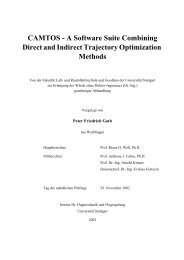- Page 1 and 2:
DATTORRO CONVEX OPTIMIZATION & EUCL
- Page 3 and 4:
Convex Optimization & Euclidean Dis
- Page 5 and 6:
for Jennie Columba ♦ Antonio ♦
- Page 7 and 8:
Prelude The constant demands of my
- Page 9 and 10:
Convex Optimization & Euclidean Dis
- Page 11 and 12:
CONVEX OPTIMIZATION & EUCLIDEAN DIS
- Page 13 and 14:
List of Figures 1 Overview 19 1 Ori
- Page 15 and 16:
LIST OF FIGURES 15 3 Geometry of co
- Page 17 and 18:
LIST OF FIGURES 17 126 Decomposing
- Page 19 and 20:
Chapter 1 Overview Convex Optimizat
- Page 21 and 22:
ˇx 4 ˇx 3 ˇx 2 Figure 2: Applica
- Page 23 and 24:
23 Figure 4: This coarsely discreti
- Page 25 and 26:
ases (biorthogonal expansion). We e
- Page 27 and 28:
27 Figure 7: These bees construct a
- Page 29 and 30:
that establish its membership to th
- Page 31 and 32:
31 appendices Provided so as to be
- Page 33 and 34:
Chapter 2 Convex geometry Convexity
- Page 35 and 36:
2.1. CONVEX SET 35 2.1.2 linear ind
- Page 37 and 38:
2.1. CONVEX SET 37 2.1.6 empty set
- Page 39 and 40:
2.1. CONVEX SET 39 2.1.7.1 Line int
- Page 41 and 42:
2.1. CONVEX SET 41 (a) R 2 (b) R 3
- Page 43 and 44:
2.1. CONVEX SET 43 This theorem in
- Page 45 and 46:
2.2. VECTORIZED-MATRIX INNER PRODUC
- Page 47 and 48:
2.2. VECTORIZED-MATRIX INNER PRODUC
- Page 49 and 50:
2.2. VECTORIZED-MATRIX INNER PRODUC
- Page 51 and 52:
2.2. VECTORIZED-MATRIX INNER PRODUC
- Page 53 and 54:
2.2. VECTORIZED-MATRIX INNER PRODUC
- Page 55 and 56:
2.3. HULLS 55 Figure 16: Convex hul
- Page 57 and 58:
2.3. HULLS 57 The affine hull of tw
- Page 59 and 60:
2.3. HULLS 59 2.3.2 Convex hull The
- Page 61 and 62:
2.3. HULLS 61 In case k = N , the F
- Page 63 and 64:
2.3. HULLS 63 2.3.2.0.3 Exercise. C
- Page 65 and 66:
2.3. HULLS 65 Figure 20: A simplici
- Page 67 and 68:
2.4. HALFSPACE, HYPERPLANE 67 H + a
- Page 69 and 70:
2.4. HALFSPACE, HYPERPLANE 69 1 1
- Page 71 and 72:
2.4. HALFSPACE, HYPERPLANE 71 Recal
- Page 73 and 74:
2.4. HALFSPACE, HYPERPLANE 73 C H
- Page 75 and 76:
2.4. HALFSPACE, HYPERPLANE 75 2.4.2
- Page 77 and 78:
2.4. HALFSPACE, HYPERPLANE 77 (conf
- Page 79 and 80:
2.5. SUBSPACE REPRESENTATIONS 79 Ra
- Page 81 and 82:
2.5. SUBSPACE REPRESENTATIONS 81 If
- Page 83 and 84:
2.6. EXTREME, EXPOSED 83 2.6 Extrem
- Page 85 and 86:
2.6. EXTREME, EXPOSED 85 A B C D Fi
- Page 87 and 88:
2.7. CONES 87 2.6.1.3.1 Definition.
- Page 89 and 90:
2.7. CONES 89 0 Figure 30: Boundary
- Page 91 and 92:
2.7. CONES 91 2.7.2 Convex cone We
- Page 93 and 94:
2.7. CONES 93 Then a pointed closed
- Page 95 and 96:
2.7. CONES 95 A pointed closed conv
- Page 97 and 98:
2.8. CONE BOUNDARY 97 So the ray th
- Page 99 and 100:
2.8. CONE BOUNDARY 99 2.8.1.1 extre
- Page 101 and 102:
2.8. CONE BOUNDARY 101 2.8.2 Expose
- Page 103 and 104:
2.8. CONE BOUNDARY 103 From Theorem
- Page 105 and 106:
2.9. POSITIVE SEMIDEFINITE (PSD) CO
- Page 107 and 108:
2.9. POSITIVE SEMIDEFINITE (PSD) CO
- Page 109 and 110:
2.9. POSITIVE SEMIDEFINITE (PSD) CO
- Page 111 and 112:
2.9. POSITIVE SEMIDEFINITE (PSD) CO
- Page 113 and 114:
2.9. POSITIVE SEMIDEFINITE (PSD) CO
- Page 115 and 116:
2.9. POSITIVE SEMIDEFINITE (PSD) CO
- Page 117 and 118:
2.9. POSITIVE SEMIDEFINITE (PSD) CO
- Page 119 and 120:
2.9. POSITIVE SEMIDEFINITE (PSD) CO
- Page 121 and 122:
2.9. POSITIVE SEMIDEFINITE (PSD) CO
- Page 123 and 124:
2.9. POSITIVE SEMIDEFINITE (PSD) CO
- Page 125 and 126:
2.9. POSITIVE SEMIDEFINITE (PSD) CO
- Page 127 and 128:
2.10. CONIC INDEPENDENCE (C.I.) 127
- Page 129 and 130:
2.10. CONIC INDEPENDENCE (C.I.) 129
- Page 131 and 132:
2.10. CONIC INDEPENDENCE (C.I.) 131
- Page 133 and 134:
2.12. CONVEX POLYHEDRA 133 It follo
- Page 135 and 136:
2.12. CONVEX POLYHEDRA 135 Coeffici
- Page 137 and 138:
2.12. CONVEX POLYHEDRA 137 2.12.3 U
- Page 139 and 140:
2.12. CONVEX POLYHEDRA 139
- Page 141 and 142:
2.13. DUAL CONE & GENERALIZED INEQU
- Page 143 and 144:
2.13. DUAL CONE & GENERALIZED INEQU
- Page 145 and 146:
2.13. DUAL CONE & GENERALIZED INEQU
- Page 147 and 148:
2.13. DUAL CONE & GENERALIZED INEQU
- Page 149 and 150:
2.13. DUAL CONE & GENERALIZED INEQU
- Page 151 and 152:
2.13. DUAL CONE & GENERALIZED INEQU
- Page 153 and 154:
2.13. DUAL CONE & GENERALIZED INEQU
- Page 155 and 156:
2.13. DUAL CONE & GENERALIZED INEQU
- Page 157 and 158:
2.13. DUAL CONE & GENERALIZED INEQU
- Page 159 and 160:
2.13. DUAL CONE & GENERALIZED INEQU
- Page 161 and 162:
2.13. DUAL CONE & GENERALIZED INEQU
- Page 163 and 164:
2.13. DUAL CONE & GENERALIZED INEQU
- Page 165 and 166:
2.13. DUAL CONE & GENERALIZED INEQU
- Page 167 and 168:
2.13. DUAL CONE & GENERALIZED INEQU
- Page 169 and 170:
2.13. DUAL CONE & GENERALIZED INEQU
- Page 171 and 172:
2.13. DUAL CONE & GENERALIZED INEQU
- Page 173 and 174:
2.13. DUAL CONE & GENERALIZED INEQU
- Page 175 and 176:
2.13. DUAL CONE & GENERALIZED INEQU
- Page 177 and 178:
2.13. DUAL CONE & GENERALIZED INEQU
- Page 179 and 180:
2.13. DUAL CONE & GENERALIZED INEQU
- Page 181 and 182:
2.13. DUAL CONE & GENERALIZED INEQU
- Page 183 and 184:
2.13. DUAL CONE & GENERALIZED INEQU
- Page 185 and 186:
2.13. DUAL CONE & GENERALIZED INEQU
- Page 187 and 188:
2.13. DUAL CONE & GENERALIZED INEQU
- Page 189 and 190:
2.13. DUAL CONE & GENERALIZED INEQU
- Page 191 and 192:
2.13. DUAL CONE & GENERALIZED INEQU
- Page 193 and 194:
2.13. DUAL CONE & GENERALIZED INEQU
- Page 195 and 196:
Chapter 3 Geometry of convex functi
- Page 197 and 198:
3.1. CONVEX FUNCTION 197 f 1 (x) f
- Page 199 and 200:
3.1. CONVEX FUNCTION 199 3.1.3 norm
- Page 201 and 202:
3.1. CONVEX FUNCTION 201 A B 1 Figu
- Page 203 and 204:
3.1. CONVEX FUNCTION 203 k/m 1 0.9
- Page 205 and 206:
k∑ i=1 3.1. CONVEX FUNCTION 205 S
- Page 207 and 208:
3.1. CONVEX FUNCTION 207 rather x >
- Page 209 and 210:
3.1. CONVEX FUNCTION 209 rather ] x
- Page 211 and 212:
3.1. CONVEX FUNCTION 211 3.1.6.0.2
- Page 213 and 214:
3.1. CONVEX FUNCTION 213 q(x) f(x)
- Page 215 and 216:
3.1. CONVEX FUNCTION 215 3.1.7.0.2
- Page 217 and 218:
3.1. CONVEX FUNCTION 217 We learned
- Page 219 and 220:
3.1. CONVEX FUNCTION 219 Since opti
- Page 221 and 222:
3.1. CONVEX FUNCTION 221 2 1.5 1 0.
- Page 223 and 224:
3.1. CONVEX FUNCTION 223 Setting th
- Page 225 and 226:
3.1. CONVEX FUNCTION 225 Similarly,
- Page 227 and 228:
3.1. CONVEX FUNCTION 227 For vector
- Page 229 and 230:
3.1. CONVEX FUNCTION 229 This means
- Page 231 and 232:
3.1. CONVEX FUNCTION 231 f(Y ) −
- Page 233 and 234:
3.2. MATRIX-VALUED CONVEX FUNCTION
- Page 235 and 236:
3.2. MATRIX-VALUED CONVEX FUNCTION
- Page 237 and 238:
3.2. MATRIX-VALUED CONVEX FUNCTION
- Page 239 and 240:
3.3. QUASICONVEX 239 exponential al
- Page 241 and 242:
3.3. QUASICONVEX 241 Unlike convex
- Page 243 and 244:
3.4. SALIENT PROPERTIES 243 6. (af
- Page 245 and 246:
Chapter 4 Semidefinite programming
- Page 247 and 248:
4.1. CONIC PROBLEM 247 where K is a
- Page 249 and 250:
4.1. CONIC PROBLEM 249 4.1.1.2 Redu
- Page 251 and 252:
4.1. CONIC PROBLEM 251 In any SDP f
- Page 253 and 254:
4.1. CONIC PROBLEM 253 Proposition
- Page 255 and 256:
4.2. FRAMEWORK 255 sets are closed
- Page 257 and 258:
4.2. FRAMEWORK 257 4.2.1.1.3 Exampl
- Page 259 and 260:
4.2. FRAMEWORK 259 4.2.2 Duals The
- Page 261 and 262:
4.2. FRAMEWORK 261 When equality is
- Page 263 and 264:
4.2. FRAMEWORK 263 The pseudoinvers
- Page 265 and 266:
4.2. FRAMEWORK 265 For the data giv
- Page 267 and 268:
4.2. FRAMEWORK 267 minimizes an aff
- Page 269 and 270:
4.3. RANK REDUCTION 269 whose rank
- Page 271 and 272:
4.3. RANK REDUCTION 271 and where m
- Page 273 and 274:
4.3. RANK REDUCTION 273 4.3.3 Optim
- Page 275 and 276:
4.3. RANK REDUCTION 275 Initialize:
- Page 277 and 278:
4.4. RANK-CONSTRAINED SEMIDEFINITE
- Page 279 and 280:
4.4. RANK-CONSTRAINED SEMIDEFINITE
- Page 281 and 282:
4.4. RANK-CONSTRAINED SEMIDEFINITE
- Page 283 and 284:
4.4. RANK-CONSTRAINED SEMIDEFINITE
- Page 285 and 286:
4.4. RANK-CONSTRAINED SEMIDEFINITE
- Page 287 and 288:
4.4. RANK-CONSTRAINED SEMIDEFINITE
- Page 289 and 290:
4.4. RANK-CONSTRAINED SEMIDEFINITE
- Page 291 and 292:
4.4. RANK-CONSTRAINED SEMIDEFINITE
- Page 293 and 294:
4.4. RANK-CONSTRAINED SEMIDEFINITE
- Page 295 and 296:
4.5. CONSTRAINING CARDINALITY 295 m
- Page 297 and 298:
4.5. CONSTRAINING CARDINALITY 297 m
- Page 299 and 300:
4.5. CONSTRAINING CARDINALITY 299 a
- Page 301 and 302:
4.5. CONSTRAINING CARDINALITY 301 f
- Page 303 and 304:
4.5. CONSTRAINING CARDINALITY 303 n
- Page 305 and 306:
4.5. CONSTRAINING CARDINALITY 305 W
- Page 307 and 308:
4.5. CONSTRAINING CARDINALITY 307 t
- Page 309 and 310:
4.6. CARDINALITY AND RANK CONSTRAIN
- Page 311 and 312:
4.6. CARDINALITY AND RANK CONSTRAIN
- Page 313 and 314:
4.6. CARDINALITY AND RANK CONSTRAIN
- Page 315 and 316:
4.6. CARDINALITY AND RANK CONSTRAIN
- Page 317 and 318:
4.6. CARDINALITY AND RANK CONSTRAIN
- Page 319 and 320:
4.6. CARDINALITY AND RANK CONSTRAIN
- Page 321 and 322:
4.6. CARDINALITY AND RANK CONSTRAIN
- Page 323 and 324:
4.6. CARDINALITY AND RANK CONSTRAIN
- Page 325 and 326:
4.6. CARDINALITY AND RANK CONSTRAIN
- Page 327 and 328:
4.6. CARDINALITY AND RANK CONSTRAIN
- Page 329 and 330:
4.6. CARDINALITY AND RANK CONSTRAIN
- Page 331 and 332:
4.6. CARDINALITY AND RANK CONSTRAIN
- Page 333 and 334:
4.6. CARDINALITY AND RANK CONSTRAIN
- Page 335 and 336:
4.6. CARDINALITY AND RANK CONSTRAIN
- Page 337 and 338:
4.6. CARDINALITY AND RANK CONSTRAIN
- Page 339 and 340:
4.6. CARDINALITY AND RANK CONSTRAIN
- Page 341 and 342:
4.7. CONVEX ITERATION RANK-1 341 fi
- Page 343 and 344:
4.7. CONVEX ITERATION RANK-1 343 Gi
- Page 345 and 346:
Chapter 5 Euclidean Distance Matrix
- Page 347 and 348:
5.2. FIRST METRIC PROPERTIES 347 co
- Page 349 and 350:
5.3. ∃ FIFTH EUCLIDEAN METRIC PRO
- Page 351 and 352:
5.3. ∃ FIFTH EUCLIDEAN METRIC PRO
- Page 353 and 354:
5.4. EDM DEFINITION 353 The collect
- Page 355 and 356:
5.4. EDM DEFINITION 355 5.4.2 Gram-
- Page 357 and 358:
5.4. EDM DEFINITION 357 D ∈ EDM N
- Page 359 and 360:
5.4. EDM DEFINITION 359 5.4.2.2.1 E
- Page 361 and 362:
5.4. EDM DEFINITION 361 ten affine
- Page 363 and 364:
5.4. EDM DEFINITION 363 spheres: Th
- Page 365 and 366:
5.4. EDM DEFINITION 365 By eliminat
- Page 367 and 368:
5.4. EDM DEFINITION 367 where Φ ij
- Page 369 and 370:
5.4. EDM DEFINITION 369 5.4.2.2.6 D
- Page 371 and 372:
5.4. EDM DEFINITION 371 10 5 ˇx 4
- Page 373 and 374:
5.4. EDM DEFINITION 373 corrected b
- Page 375 and 376:
5.4. EDM DEFINITION 375 by translat
- Page 377 and 378:
5.4. EDM DEFINITION 377 Crippen & H
- Page 379 and 380:
5.4. EDM DEFINITION 379 where ([√
- Page 381 and 382:
5.4. EDM DEFINITION 381 because (A.
- Page 383 and 384:
5.5. INVARIANCE 383 5.5.1.0.1 Examp
- Page 385 and 386:
5.5. INVARIANCE 385 x 2 x 2 x 3 x 1
- Page 387 and 388:
5.6. INJECTIVITY OF D & UNIQUE RECO
- Page 389 and 390:
5.6. INJECTIVITY OF D & UNIQUE RECO
- Page 391 and 392:
5.6. INJECTIVITY OF D & UNIQUE RECO
- Page 393 and 394:
5.7. EMBEDDING IN AFFINE HULL 393 5
- Page 395 and 396:
5.7. EMBEDDING IN AFFINE HULL 395 F
- Page 397 and 398:
5.7. EMBEDDING IN AFFINE HULL 397 5
- Page 399 and 400:
5.8. EUCLIDEAN METRIC VERSUS MATRIX
- Page 401 and 402:
5.8. EUCLIDEAN METRIC VERSUS MATRIX
- Page 403 and 404:
5.8. EUCLIDEAN METRIC VERSUS MATRIX
- Page 405 and 406:
5.8. EUCLIDEAN METRIC VERSUS MATRIX
- Page 407 and 408:
5.9. BRIDGE: CONVEX POLYHEDRA TO ED
- Page 409 and 410:
5.9. BRIDGE: CONVEX POLYHEDRA TO ED
- Page 411 and 412:
5.9. BRIDGE: CONVEX POLYHEDRA TO ED
- Page 413 and 414:
5.10. EDM-ENTRY COMPOSITION 413 of
- Page 415 and 416:
5.10. EDM-ENTRY COMPOSITION 415 The
- Page 417 and 418:
5.11. EDM INDEFINITENESS 417 5.11.1
- Page 419 and 420:
5.11. EDM INDEFINITENESS 419 we hav
- Page 421 and 422:
5.11. EDM INDEFINITENESS 421 So bec
- Page 423 and 424:
5.11. EDM INDEFINITENESS 423 where
- Page 425 and 426:
5.12. LIST RECONSTRUCTION 425 where
- Page 427 and 428:
5.12. LIST RECONSTRUCTION 427 (a) (
- Page 429 and 430:
5.13. RECONSTRUCTION EXAMPLES 429 D
- Page 431 and 432:
5.13. RECONSTRUCTION EXAMPLES 431 T
- Page 433 and 434:
5.13. RECONSTRUCTION EXAMPLES 433 w
- Page 435 and 436:
5.14. FIFTH PROPERTY OF EUCLIDEAN M
- Page 437 and 438:
5.14. FIFTH PROPERTY OF EUCLIDEAN M
- Page 439 and 440:
5.14. FIFTH PROPERTY OF EUCLIDEAN M
- Page 441 and 442:
5.14. FIFTH PROPERTY OF EUCLIDEAN M
- Page 443 and 444:
5.14. FIFTH PROPERTY OF EUCLIDEAN M
- Page 445 and 446:
Chapter 6 Cone of distance matrices
- Page 447 and 448:
6.1. DEFINING EDM CONE 447 6.1 Defi
- Page 449 and 450:
6.2. POLYHEDRAL BOUNDS 449 This con
- Page 451 and 452:
6.3. √ EDM CONE IS NOT CONVEX 451
- Page 453 and 454:
6.4. A GEOMETRY OF COMPLETION 453 (
- Page 455 and 456:
6.4. A GEOMETRY OF COMPLETION 455 (
- Page 457 and 458:
6.4. A GEOMETRY OF COMPLETION 457 F
- Page 459 and 460:
6.5. EDM DEFINITION IN 11 T 459 by
- Page 461 and 462:
6.5. EDM DEFINITION IN 11 T 461 6.5
- Page 463 and 464:
6.5. EDM DEFINITION IN 11 T 463 1 0
- Page 465 and 466:
6.5. EDM DEFINITION IN 11 T 465 6.5
- Page 467 and 468:
6.6. CORRESPONDENCE TO PSD CONE S N
- Page 469 and 470:
6.6. CORRESPONDENCE TO PSD CONE S N
- Page 471 and 472:
6.6. CORRESPONDENCE TO PSD CONE S N
- Page 473 and 474:
6.7. VECTORIZATION & PROJECTION INT
- Page 475 and 476:
6.7. VECTORIZATION & PROJECTION INT
- Page 477 and 478:
6.8. DUAL EDM CONE 477 When the Fin
- Page 479 and 480:
6.8. DUAL EDM CONE 479 Proof. First
- Page 481 and 482:
6.8. DUAL EDM CONE 481 EDM 2 = S 2
- Page 483 and 484:
6.8. DUAL EDM CONE 483 whose veraci
- Page 485 and 486:
6.8. DUAL EDM CONE 485 6.8.1.3.1 Ex
- Page 487 and 488:
6.8. DUAL EDM CONE 487 has dual aff
- Page 489 and 490:
6.8. DUAL EDM CONE 489 6.8.1.7 Scho
- Page 491 and 492:
6.9. THEOREM OF THE ALTERNATIVE 491
- Page 493 and 494:
6.10. POSTSCRIPT 493 When D is an E
- Page 495 and 496:
Chapter 7 Proximity problems In sum
- Page 497 and 498:
497 project on the subspace, then p
- Page 499 and 500:
499 H S N h 0 EDM N K = S N h ∩ R
- Page 501 and 502:
501 7.0.3 Problem approach Problems
- Page 503 and 504:
7.1. FIRST PREVALENT PROBLEM: 503 f
- Page 505 and 506:
7.1. FIRST PREVALENT PROBLEM: 505 7
- Page 507 and 508:
7.1. FIRST PREVALENT PROBLEM: 507 d
- Page 509 and 510:
7.1. FIRST PREVALENT PROBLEM: 509 7
- Page 511 and 512:
7.1. FIRST PREVALENT PROBLEM: 511 w
- Page 513 and 514:
7.1. FIRST PREVALENT PROBLEM: 513 T
- Page 515 and 516:
7.2. SECOND PREVALENT PROBLEM: 515
- Page 517 and 518:
7.2. SECOND PREVALENT PROBLEM: 517
- Page 519 and 520:
7.2. SECOND PREVALENT PROBLEM: 519
- Page 521 and 522:
7.2. SECOND PREVALENT PROBLEM: 521
- Page 523 and 524:
7.2. SECOND PREVALENT PROBLEM: 523
- Page 525 and 526:
7.3. THIRD PREVALENT PROBLEM: 525 g
- Page 527 and 528:
7.3. THIRD PREVALENT PROBLEM: 527 w
- Page 529 and 530:
7.3. THIRD PREVALENT PROBLEM: 529 7
- Page 531 and 532:
7.3. THIRD PREVALENT PROBLEM: 531 7
- Page 533 and 534:
7.3. THIRD PREVALENT PROBLEM: 533 O
- Page 535 and 536:
7.4. CONCLUSION 535 The rank constr
- Page 537 and 538:
Appendix A Linear algebra A.1 Main-
- Page 539 and 540:
A.1. MAIN-DIAGONAL δ OPERATOR, λ
- Page 541 and 542:
A.1. MAIN-DIAGONAL δ OPERATOR, λ
- Page 543 and 544:
A.2. SEMIDEFINITENESS: DOMAIN OF TE
- Page 545 and 546: A.3. PROPER STATEMENTS 545 (AB) T
- Page 547 and 548: A.3. PROPER STATEMENTS 547 A.3.1 Se
- Page 549 and 550: A.3. PROPER STATEMENTS 549 For A di
- Page 551 and 552: A.3. PROPER STATEMENTS 551 Diagonal
- Page 553 and 554: A.3. PROPER STATEMENTS 553 For A,B
- Page 555 and 556: A.3. PROPER STATEMENTS 555 A.3.1.0.
- Page 557 and 558: A.4. SCHUR COMPLEMENT 557 A.4 Schur
- Page 559 and 560: A.4. SCHUR COMPLEMENT 559 A.4.0.0.2
- Page 561 and 562: A.5. EIGEN DECOMPOSITION 561 When B
- Page 563 and 564: A.5. EIGEN DECOMPOSITION 563 dim N(
- Page 565 and 566: A.6. SINGULAR VALUE DECOMPOSITION,
- Page 567 and 568: A.6. SINGULAR VALUE DECOMPOSITION,
- Page 569 and 570: A.7. ZEROS 569 Given symmetric matr
- Page 571 and 572: A.7. ZEROS 571 (TRANSPOSE.) Likewis
- Page 573 and 574: A.7. ZEROS 573 For X,A∈ S M + [31
- Page 575 and 576: A.7. ZEROS 575 A.7.5.0.1 Propositio
- Page 577 and 578: Appendix B Simple matrices Mathemat
- Page 579 and 580: B.1. RANK-ONE MATRIX (DYAD) 579 R(v
- Page 581 and 582: B.1. RANK-ONE MATRIX (DYAD) 581 ran
- Page 583 and 584: B.2. DOUBLET 583 R([u v ]) R(Π)= R
- Page 585 and 586: B.3. ELEMENTARY MATRIX 585 If λ
- Page 587 and 588: B.4. AUXILIARY V -MATRICES 587 the
- Page 589 and 590: B.4. AUXILIARY V -MATRICES 589 18.
- Page 591 and 592: B.5. ORTHOGONAL MATRIX 591 B.5 Orth
- Page 593 and 594: B.5. ORTHOGONAL MATRIX 593 Figure 1
- Page 595: Appendix C Some analytical optimal
- Page 599 and 600: C.2. TRACE, SINGULAR AND EIGEN VALU
- Page 601 and 602: C.2. TRACE, SINGULAR AND EIGEN VALU
- Page 603 and 604: C.3. ORTHOGONAL PROCRUSTES PROBLEM
- Page 605 and 606: C.4. TWO-SIDED ORTHOGONAL PROCRUSTE
- Page 607 and 608: C.4. TWO-SIDED ORTHOGONAL PROCRUSTE
- Page 609 and 610: Appendix D Matrix calculus From too
- Page 611 and 612: D.1. DIRECTIONAL DERIVATIVE, TAYLOR
- Page 613 and 614: D.1. DIRECTIONAL DERIVATIVE, TAYLOR
- Page 615 and 616: D.1. DIRECTIONAL DERIVATIVE, TAYLOR
- Page 617 and 618: D.1. DIRECTIONAL DERIVATIVE, TAYLOR
- Page 619 and 620: D.1. DIRECTIONAL DERIVATIVE, TAYLOR
- Page 621 and 622: D.1. DIRECTIONAL DERIVATIVE, TAYLOR
- Page 623 and 624: D.1. DIRECTIONAL DERIVATIVE, TAYLOR
- Page 625 and 626: D.1. DIRECTIONAL DERIVATIVE, TAYLOR
- Page 627 and 628: D.1. DIRECTIONAL DERIVATIVE, TAYLOR
- Page 629 and 630: D.1. DIRECTIONAL DERIVATIVE, TAYLOR
- Page 631 and 632: D.2. TABLES OF GRADIENTS AND DERIVA
- Page 633 and 634: D.2. TABLES OF GRADIENTS AND DERIVA
- Page 635 and 636: D.2. TABLES OF GRADIENTS AND DERIVA
- Page 637 and 638: D.2. TABLES OF GRADIENTS AND DERIVA
- Page 639 and 640: Appendix E Projection For any A∈
- Page 641 and 642: 641 U T = U † for orthonormal (in
- Page 643 and 644: E.1. IDEMPOTENT MATRICES 643 where
- Page 645 and 646: E.1. IDEMPOTENT MATRICES 645 order,
- Page 647 and 648:
E.1. IDEMPOTENT MATRICES 647 When t
- Page 649 and 650:
E.3. SYMMETRIC IDEMPOTENT MATRICES
- Page 651 and 652:
E.3. SYMMETRIC IDEMPOTENT MATRICES
- Page 653 and 654:
E.3. SYMMETRIC IDEMPOTENT MATRICES
- Page 655 and 656:
E.5. PROJECTION EXAMPLES 655 E.4.0.
- Page 657 and 658:
E.5. PROJECTION EXAMPLES 657 a ∗
- Page 659 and 660:
E.5. PROJECTION EXAMPLES 659 E.5.0.
- Page 661 and 662:
E.6. VECTORIZATION INTERPRETATION,
- Page 663 and 664:
E.6. VECTORIZATION INTERPRETATION,
- Page 665 and 666:
E.6. VECTORIZATION INTERPRETATION,
- Page 667 and 668:
E.6. VECTORIZATION INTERPRETATION,
- Page 669 and 670:
E.7. ON VECTORIZED MATRICES OF HIGH
- Page 671 and 672:
E.7. ON VECTORIZED MATRICES OF HIGH
- Page 673 and 674:
E.8. RANGE/ROWSPACE INTERPRETATION
- Page 675 and 676:
E.9. PROJECTION ON CONVEX SET 675 A
- Page 677 and 678:
E.9. PROJECTION ON CONVEX SET 677 W
- Page 679 and 680:
E.9. PROJECTION ON CONVEX SET 679 P
- Page 681 and 682:
E.9. PROJECTION ON CONVEX SET 681 E
- Page 683 and 684:
E.9. PROJECTION ON CONVEX SET 683 T
- Page 685 and 686:
E.9. PROJECTION ON CONVEX SET 685
- Page 687 and 688:
E.10. ALTERNATING PROJECTION 687 E.
- Page 689 and 690:
E.10. ALTERNATING PROJECTION 689 b
- Page 691 and 692:
E.10. ALTERNATING PROJECTION 691 a
- Page 693 and 694:
E.10. ALTERNATING PROJECTION 693 (a
- Page 695 and 696:
E.10. ALTERNATING PROJECTION 695 wh
- Page 697 and 698:
E.10. ALTERNATING PROJECTION 697 E.
- Page 699 and 700:
E.10. ALTERNATING PROJECTION 699 10
- Page 701 and 702:
E.10. ALTERNATING PROJECTION 701 E.
- Page 703 and 704:
E.10. ALTERNATING PROJECTION 703 E
- Page 705 and 706:
Appendix F Notation and a few defin
- Page 707 and 708:
707 a.i. c.i. l.i. w.r.t affinely i
- Page 709 and 710:
709 is or ← → t → 0 + as in
- Page 711 and 712:
711 ∑ π(γ) Ξ Π ∏ ψ(Z) D D
- Page 713 and 714:
713 R m×n Euclidean vector space o
- Page 715 and 716:
715 H − H + ∂H ∂H ∂H −
- Page 717 and 718:
717 O O sort-index matrix order of
- Page 719 and 720:
(x,y) angle between vectors x and y
- Page 721 and 722:
Bibliography [1] Suliman Al-Homidan
- Page 723 and 724:
BIBLIOGRAPHY 723 [24] Alexander I.
- Page 725 and 726:
BIBLIOGRAPHY 725 [52] Stephen Boyd,
- Page 727 and 728:
BIBLIOGRAPHY 727 [78] Frank Critchl
- Page 729 and 730:
BIBLIOGRAPHY 729 [105] Richard L. D
- Page 731 and 732:
BIBLIOGRAPHY 731 [132] Michel X. Go
- Page 733 and 734:
BIBLIOGRAPHY 733 [162] T. Herrmann,
- Page 735 and 736:
BIBLIOGRAPHY 735 [191] Mark Kahrs a
- Page 737 and 738:
BIBLIOGRAPHY 737 [220] K. V. Mardia
- Page 739 and 740:
BIBLIOGRAPHY 739 [250] Pythagoras P
- Page 741 and 742:
BIBLIOGRAPHY 741 [277] Anthony Man-
- Page 743 and 744:
BIBLIOGRAPHY 743 [306] Michael W. T
- Page 745 and 746:
[333] Margaret H. Wright. The inter
- Page 747 and 748:
Index 0-norm, 203, 261, 294, 296, 2
- Page 749 and 750:
INDEX 749 product, 43, 92, 147, 254
- Page 751 and 752:
INDEX 751 coordinates, 140, 170, 17
- Page 753 and 754:
INDEX 753 affine dimension, 485 fea
- Page 755 and 756:
INDEX 755 affine, 209 nonlinear, 19
- Page 757 and 758:
INDEX 757 of point, 37 ray, 90 rela
- Page 759 and 760:
INDEX 759 normal, 47, 548, 563 norm
- Page 761 and 762:
INDEX 761 strictly, 515, 520 functi
- Page 763 and 764:
INDEX 763 vector, 45, 241, 248, 325
- Page 765 and 766:
INDEX 765 convex envelope, see conv
- Page 767 and 768:
INDEX 767 cone, 418, 420, 507 dual,
- Page 769 and 770:
INDEX 769 trilateration, 21, 42, 36
- Page 772:
Convex Optimization & Euclidean Dis















